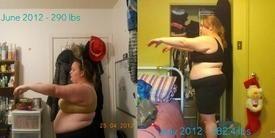Muscle vs. Fat weight

Kipperdog123
Posts: 59 Member
When you exercise and then step on the scale and you haven't lost weight and they tell you, "oh, it's just muscle mass that you gained"- is that really true? Does muscle weigh more than fat? And is it water weight that you gained when you stepped on the scale?
0
Replies
-
I really wish people would stop saying muscle weighs more than fat.
I really really do!0 -
Are you meaning like stepping on the sale right after you exercise? It's water, even if you muscle did weigh more than fat, which it doesn't, you don't gain muscle after one work out.0
-
No, I meant like the next morning when you step on the scale.0
-
It's water weight from your muscles repairing themselves.
It's typical to gain weight (water weight) for the first couple weeks when you start exercising. Just do a regular weigh-in (I do every Friday am) and base it off of that. Measure yourself because sometimes inches melt away before the weight does.0 -
Depending how hard your work out was, it's water.
When you lift weights and stuff your muscles get tiny little tears in them, they store water to help heal them.0 -
I really wish people would stop saying muscle weighs more than fat.
I really really do!
Well, for the same volume it does...
After weight lifting though it's very likely just water weight.0 -
I really wish people would stop saying muscle weighs more than fat.
I really really do!
Well, for the same volume it does...
After weight lifting though it's very likely just water weight.
5 pounds is 5 pounds no matter how you slice it.
Yes, 5 pounds of muscle takes up less space than 5 pounds of fat, but it's still 5 pounds.0 -
Practically impossible to gain muscle on calorie deficit. It's water.
A.C.E. Certified Personal/Group FitnessTrainer
IDEA Fitness member
Kickboxing Certified Instructor
Been in fitness for 28+ years and have studied kinesiology and nutrition0 -
By volume muscle weighs more than fatI really wish people would stop saying muscle weighs more than fat.
I really really do!
A gallon of muscle weighs more than a gallon of fat.
Think of it that way, because that's what people mean - not pounds.0 -
Agree with the statements about it is probably water weight. That said, muscle does not weigh more than fat. It is denser and takes up less space. For example, I have always been muscular and people ALWAYS guess my weight to be about 10 pounds LESS than what I actually weigh!0
-
^^^^^^Practically impossible to gain muscle on calorie deficit. It's water.
And THIS!0 -
By volume muscle weighs more than fatI really wish people would stop saying muscle weighs more than fat.
I really really do!
A gallon of muscle weighs more than a gallon of fat.
Think of it that way, because that's what people mean - not pounds.
But my whole point is, 5 pounds is still 5 pounds. If you weigh 5432 pounds and lose 432 pounds of fat but gain 432 pounds of muscle you still weigh 5432 pounds.0 -
Does muscle weigh more than fat?
I think what you're trying to say is that muscle is more dense than fat. I takes up less room so you can be 150 with a the same size waist as someone who is 130 with a higher % of body fat.0 -
Yes yes, people do actually know this. But they previous poster is trying to get you to understand what people mean when they say this. The semantics shouldn't trip you up. If I say 'I'm starving' everyone knows I am just hungry. Not literally starving.
By volume muscle weighs more than fatI really wish people would stop saying muscle weighs more than fat.
I really really do!
A gallon of muscle weighs more than a gallon of fat.
Think of it that way, because that's what people mean - not pounds.
But my whole point is, 5 pounds is still 5 pounds. If you weigh 5432 pounds and lose 432 pounds of fat but gain 432 pounds of muscle you still weigh 5432 pounds.0 -
To all the mean posts on here : http://www.myfitnesspal.com/topics/show/660272-this-really-makes-me-angry
THANK YOU.0 -
Right, everybody knows that, but people mean VOLUME - even if they don't say it right.
By volume muscle weighs more than fatI really wish people would stop saying muscle weighs more than fat.
I really really do!
A gallon of muscle weighs more than a gallon of fat.
Think of it that way, because that's what people mean - not pounds.
But my whole point is, 5 pounds is still 5 pounds. If you weigh 5432 pounds and lose 432 pounds of fat but gain 432 pounds of muscle you still weigh 5432 pounds.
Sometimes it's best to see what people are trying to say, and just roll with it.
There are too many arguments otherwise. :drinker:0 -
Practically impossible to gain muscle on calorie deficit. It's water.
I think it's difficult to gain muscle while on a calorie deficit but it can happen. I've definitely gained muscle in the past three months while I've lost 10 lbs since I've incorporated a lifting routine. It is important to get an adequate amount of protein while you are doing it though and I have no doubt that I would have gained more muscle (and strength) if I wasn't trying to lose weight at the same time.
I will say that I can tell which days that I've worked out hard lifting because I do typically show a 1 to 2 pound gain the following day. BTW, Muscle is denser than fat, so in the practical sense that people are talking about (two people of the same size with differing muscle composition will weigh different amounts with the more muscular person weighing more), muscle is "heavier" than fat. That is why men typically weigh more than women at the same height.0 -
If you're exercising with the expectation to lose weight, you will be disappointed. Exercise causes retention of water for damage repair. Exercise is only about 10% of fat loss (maybe less). Those of you who "eat your exercise calories" are setup for even more failure with the same expectation. Also, No one puts on muscle mass quickly unless they are on drugs. We don't lose 20lbs of fat and replace it with 20lbs of muscle in 3 months.
Want to lose fat? Its all diet. Be in a deficit. Exercise only helps a small amount.
Want to gain muscle? Its all diet. Be in a surplus and exercise.
Over train on cardio? Google cortisol and look at the side effects.
Notice I said fat loss. Weight is a poor and generally wrong way of identifying fat loss. Use a tape measure and lose the scale.0 -
Did you really just link your own rant to another post? That's funny.To all the mean posts on here : http://www.myfitnesspal.com/topics/show/660272-this-really-makes-me-angry
THANK YOU.0 -
I really wish people would stop saying muscle weighs more than fat.
I really really do!
Muscle weighs more than fat in the same way bowling balls weigh more than feathers. Obviously a pound is a pound (duh) but some items are denser than other, meaning they have more or less mass. So saying muscle weighs more than fat isn't really untrue, it just seems to mislead and confuse people.
OP, the scale is generally a poor indicator of your health, and you may still be losing inches but be staying at the same weight. It's not going to happen overnight, so it's also important to remember your weight will fluctuate about five pounds in either direction. You might not see a change overnight, but gaining either muscle OR fat takes much longer than a day.0 -
I agree that you can't lose 20 lbs of fat and gain 20 lbs of muscle in 3 months. I do think I've lost 15 lbs of fat and gained 5 lbs of muscle. That's just my guess though.0
-
With optimal conditions a woman can only hope to gain around a quarter to half pound of muscle a week. Thats if you are eating in a surplus and lifting heavy weights. If you are eating in a calorie deficit you are not gaining that much. So to answer your question, no you did not gain weight because of muscle over one night after a workout.
Don't worry about the short term, focus on the long term. Hang in there and stick with it! :drinker:0 -
NOBODY says that 5 pounds of muscle weighs more than 5 pounds of fat. People say that, in your predetermined body size (height, frame) muscle will weigh more than fat. Your "volume" is pretty much set by your height and weight. It's the volume of fat and muscle being compared. Yes, 5 pounds is 5 pounds, but gaining 5 pounds of fat looks totally different than gaining 5 pounds of muscle. Losing 1 pound of fat, and gaining 2 pounds of muscle, makes you look smaller, even though you weigh more. That's what people mean when they say muscle weighs more than fat.
By volume muscle weighs more than fatI really wish people would stop saying muscle weighs more than fat.
I really really do!
A gallon of muscle weighs more than a gallon of fat.
Think of it that way, because that's what people mean - not pounds.
But my whole point is, 5 pounds is still 5 pounds. If you weigh 5432 pounds and lose 432 pounds of fat but gain 432 pounds of muscle you still weigh 5432 pounds.
It takes a serious flaw in logical thinking to misinterpret the statement that badly. When comparing weight, equal volume is implied.0 -
If you're exercising with the expectation to lose weight, you will be disappointed. Exercise causes retention of water for damage repair. Exercise is only about 10% of fat loss (maybe less). Those of you who "eat your exercise calories" are setup for even more failure with the same expectation. Also, No one puts on muscle mass quickly unless they are on drugs. We don't lose 20lbs of fat and replace it with 20lbs of muscle in 3 months.
Want to lose fat? Its all diet. Be in a deficit. Exercise only helps a small amount.
Want to gain muscle? Its all diet. Be in a surplus and exercise.
Over train on cardio? Google cortisol and look at the side effects.
Notice I said fat loss. Weight is a poor and generally wrong way of identifying fat loss. Use a tape measure and lose the scale.
I agree with most of what you're saying but I strongly disagree with gaining muscle being "all" diet. Gaining muscle comes from eating in a surplus and progression in weight training. You are not going to gain muscle just by eating in a surplus.0 -
Christ on a cracker!
I know what you guys mean by the volume. But that isn't what she asked at all. She didn't say anything about her clothes fitting better. She asked about a gain, and if muscle weighs more than fat.
I see a lot of people ask why they gained weight after working out, and people answer with gaining muscle. She didn't gain muscle over night.
That's all I was getting at.
Christ!0 -
Does muscle weigh more than fat?
I think what you're trying to say is that muscle is more dense than fat. I takes up less room so you can be 150 with a the same size waist as someone who is 130 with a higher % of body fat.
All I know is that I now want waffles with sausage!0 -
No one puts on muscle mass quickly unless they are on drugs. We don't lose 20lbs of fat and replace it with 20lbs of muscle in 3 months.
Thank you! I get so tired of seeing the phrase "you're gaining muscle" thrown about as the answer to why people haven't lost what they expected to lose, or even gained a little. Adding muscle takes a long time and the gains, from what I've read (don't quote me, since I don't remember where), are typically fairly small for women, and that is under the best conditions.
Also, on the semantic discussion: "muscle weighs more than fat" is a personal irritant, but I don't think it requires a snarky response. Unless I'm in a pissy mood, then all bets are off.0 -
I agree that you will not gain muscle on a deficit.
However -But my whole point is, 5 pounds is still 5 pounds. If you weigh 5432 pounds and lose 432 pounds of fat but gain 432 pounds of muscle you still weigh 5432 pounds.
If you lose 20cubic inches of fat and gain 20 cubic inches of muscle you will be heavier.
What weighs more ... an elephant or a mouse ?0 -
When you exercise and then step on the scale and you haven't lost weight and they tell you, "oh, it's just muscle mass that you gained"- is that really true? Does muscle weigh more than fat? And is it water weight that you gained when you stepped on the scale?
If you are new to weight training or exercise it is possible that you have lost body fat and gained a similar weight in muscle mass. It doesn't happen over night, though.
Using scales to measure your progress is okay but it is limited. Your body weight is just one data point. It is worth thinking about taking regular measurements with a tape measure. A good practice is to weigh yourself and take your measurements at the same time of the day each time you take them. Once a week is good enough.0
This discussion has been closed.
Categories
- All Categories
- 1.4M Health, Wellness and Goals
- 398.2K Introduce Yourself
- 44.7K Getting Started
- 261K Health and Weight Loss
- 176.4K Food and Nutrition
- 47.7K Recipes
- 233K Fitness and Exercise
- 462 Sleep, Mindfulness and Overall Wellness
- 6.5K Goal: Maintaining Weight
- 8.7K Goal: Gaining Weight and Body Building
- 153.5K Motivation and Support
- 8.4K Challenges
- 1.4K Debate Club
- 96.5K Chit-Chat
- 2.6K Fun and Games
- 4.8K MyFitnessPal Information
- 12 News and Announcements
- 21 MyFitnessPal Academy
- 1.5K Feature Suggestions and Ideas
- 3.2K MyFitnessPal Tech Support Questions















